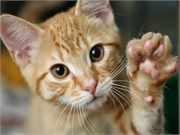- Are You Making This Expensive Thermostat Error This Winter?
- Recognizing the Signs of Hypothyroidism
- 10 Strategies to Overcome Insomnia
- Could Artificial Sweeteners Be Aging the Brain Faster?
- Techniques for Soothing Your Nervous System
- Does the Water in Your House Smell Funny? Here’s Why
- Can a Daily Dose of Apple Cider Vinegar Actually Aid Weight Loss?
- 6 Health Beverages That Can Actually Spike Your Blood Sugar
- Treatment Options for Social Anxiety Disorder
- Understanding the Connection Between Anxiety and Depression
What Kind of Cat Owner Are You?

If your favorite feline has ever deposited a dead bird or snake on the front porch, your reaction to this “gift” may be far different from your best friend’s.
A survey in Britain found that cat owners have wide-ranging views about their pets’ hunting habits.
Some — the “conscientious caretakers” — are concerned about cats’ harm to wildlife and feel some responsibility for it. Meanwhile, “freedom defenders” oppose any restrictions on their cats’ behavior.
There are concerns about the numbers of wild animals — such as birds, small mammals and reptiles — caught by domestic cats.
The survey of 56 cat owners found their attitudes fall into five categories.
Besides “conscientious caretakers” and “freedom defenders,” there are “concerned protectors,” whose emphasis is cat safety; “tolerant guardians,” who don’t like their cats’ hunting but accept it; and “laissez-faire landlords,” who are largely unaware of problems associated with cats roaming and preying on wildlife.
“Although we found a range of views, most U.K. cat owners valued outdoor access for their cats and opposed the idea of keeping them inside to prevent hunting,” said lead author Sarah Crowley, an environmental social scientist at the University of Exeter. “Cat confinement policies are therefore unlikely to find support among owners in the U.K.”
The survey of rural and urban cat owners was published Sept. 2 in the journal Frontiers in Ecology and the Environment.
Crowley said only one of the owner types viewed hunting as a positive, suggesting others might be interested in taking some steps to reduce it.
“To be most effective, efforts to reduce hunting must be compatible with owners’ diverse circumstances,” she said in a university news release.
Measures to reduce cats’ toll on wildlife may include fitting them with bells or brightly colored collar covers. They warn birds of approaching cats.
The researchers are now assessing the effectiveness of these and other measures, and how owners feel about them.
More information
The Wildlife Rescue League has more on cats and wildlife.
Source: HealthDay
Copyright © 2026 HealthDay. All rights reserved.










